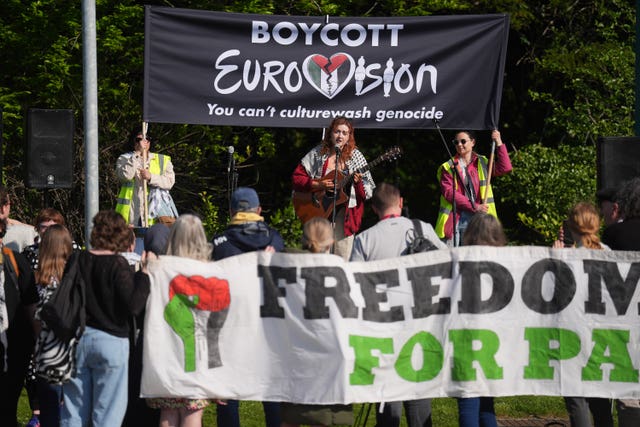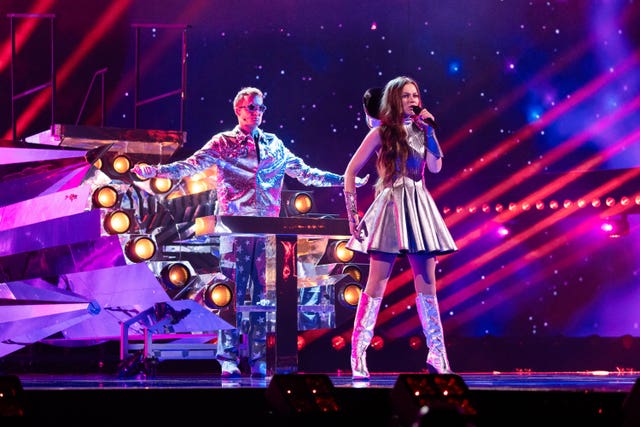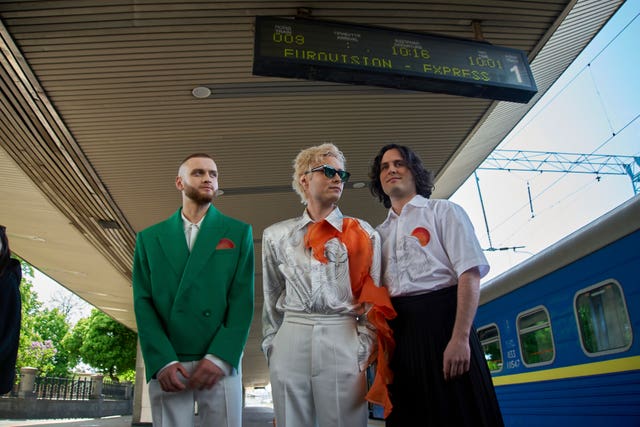Protests to hit Eurovision week amid ‘risk’ of cyber and terror attacks
Basel is hosting the 2025 contest, after Switzerland’s Nemo won last May.

Protesters could target Basel during the week of the Eurovision Song Contest, as Israel’s participation continues to generate anger amid the war in Gaza.
The city is hosting the 2025 contest, after Switzerland’s Nemo won last May in Sweden with The Code, which explored them coming to terms with their non-binary identity.
About 1,300 Swiss police officers will be on duty in Basel this week, with more forces drafted in from the Swiss Armed Forces, federal police and neighbouring countries – Germany and France – ahead of the two semi-finals on Tuesday and Thursday, and the grand final on Saturday.
Basel police’s head of communications Adrian Plachesi told the PA news agency that the force was aware these type of events could mean an “increased risk of terror attacks” from extremists, and they were also monitoring in case of “cyber attacks” on the city’s infrastructure.
The force has stepped up video surveillance because of the “heightened threat level” and the city centre has some road closures, Swiss police said.
Mr Plachesi said no permission has been granted for protests, but officers would be stationed for expected pro-Palestinian demonstrations.
He added officers “might have to intervene”, if demonstrations interfere with “public safety”.
Local campaigners Basel for Palestine attempted to place Palestinian flags near the Eurovision opening event, the Turquoise Carpet, on Sunday, and more protests are scheduled for Saturday in the city centre at 7pm.
Israel’s Government has issued a warning to its citizens travelling to Basel that “events of this type are a preferred target for threats and attacks by various terrorist elements”, and urged them to avoid “hot spots and these demonstrations, which could escalate into violence”.

They also tell those travelling to “avoid attending large-scale events associated with Israel that are not secured” and to “minimise Israeli/Jewish symbols in public spaces”.
During Malmo 2024, in Sweden, thousands of pro-Palestinian demonstrators took to the streets, including climate campaigner Greta Thunberg.
Eurovision organisers the European Broadcasting Union (EBU) had difficulty in promoting its motto, united by music, and keeping the event apolitical.
However despite the expected protests, the Swiss appear confident they will have a Eurovision to remember.
There has been speculation that former winner Celine Dion will return to the stage, and the Swiss have promised city-wide events such as a food and drink street, 250 hours of live music, and the Eurovision Village.
Their 2025 entrant is Basel-born Zoe Me, who has written Voyage in Scotland, working with Scottish songwriter and former X Factor star Ili, real name Emily Middlemas, and Theo Adams, the stage director behind Olly Alexander’s Dizzy in 2024.

Me told PA she wants to be a “good host”, and her “main goal for me is reaching people’s hearts and maybe changing their lives for the better” with her music.
Mr Plachesi also advised UK Eurovision fans to “have fun” in Basel, remember the emergency services number 112, and to download the Welcome Home – Basel app that has information on how to get help.
Current favourites to win include KAJ, who are from Finland’s Swedish-speaking minority and will represent Sweden, with the upbeat comical Bara Bada Bastu inspired by the Nordic sauna culture.
The hit is the first time the country, which is tied with Ireland with the most Eurovision wins, has entered with a song in Swedish since the 1990s, when the rules on competing in a country’s official language were relaxed.
Others in contention are Dutch entry Claude Kiambe’s C’est La Vie, Israeli singer Yuval Raphael, a survivor of the October 7 2023 Hamas attacks, with New Day Will Rise, Austrian singer JJ’s Wasted Love, and French singer Louane’s ballad Maman.
Last May, the Netherlands’ contestant Joost Klein was kicked out by the EBU just before the final, over alleged verbal threats to a female production worker.

The move was heavily criticised by Dutch broadcaster Avrotros, and months later Swedish prosecutors dropped a criminal case against Klein.
The EBU conducted a review and pledged a new code of conduct for 2025, with a raft of measures to “protect” the wellbeing of artists in Basel.
This year, former Eurovision competitors such as Ireland’s winner Charlie McGettigan, and the UK’s Mae Muller, who came second last in 2023, have signed a letter calling for a ban on Israel’s public broadcaster Kan, and accusing Israel of “genocide”, which Israel denies.
Last week, Irish protesters, including The Crying Game actor Stephen Rea, pushed for an RTE boycott of the event. The Irish broadcaster has written to the EBU to have “a wider discussion” on Israel’s inclusion.
On Tuesday Sweden, Switzerland, the Netherlands and Ukraine’s Ziferblat will perform, and on Thursday the UK’s girl group Remember Monday, Ireland’s Emmy Kristiansen and Israel.

The EBU has noted the “concerns and deeply held views around the current conflict in the Middle East”, but has pointed out that Kan is not supported by the Israeli government, which has been “threatening to close down the broadcaster”.
Last year Kan said it “faced immense pressure and an unprecedented display of hatred, notably from other delegations and artists”, when Eden Golan made the final with Hurricane.
According to the Gaza Health Ministry, more than 51,000 Palestinians, mostly women and children, have been killed in the Hamas-Israel war.
Israel disputes these figures, claiming about 20,000 militants have died.
The semi-finals and final start at 8pm UK time and are covered on BBC One and BBC Radio 2. In the final former winner Switzerland and the “big five” – the UK, France, Germany, Italy and Spain, will compete with those who get through.





